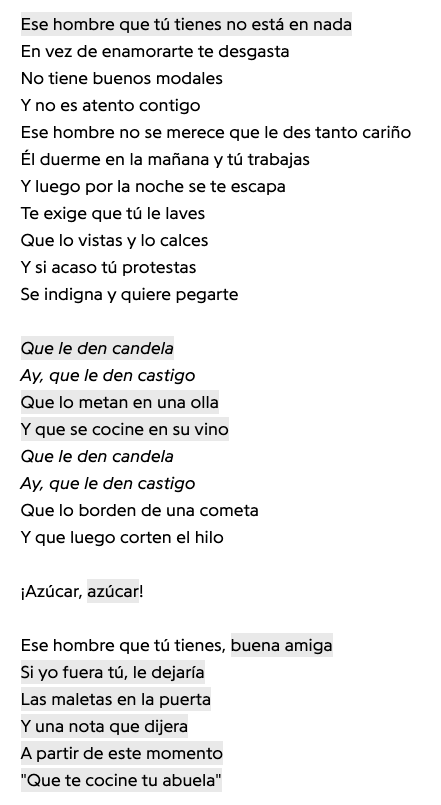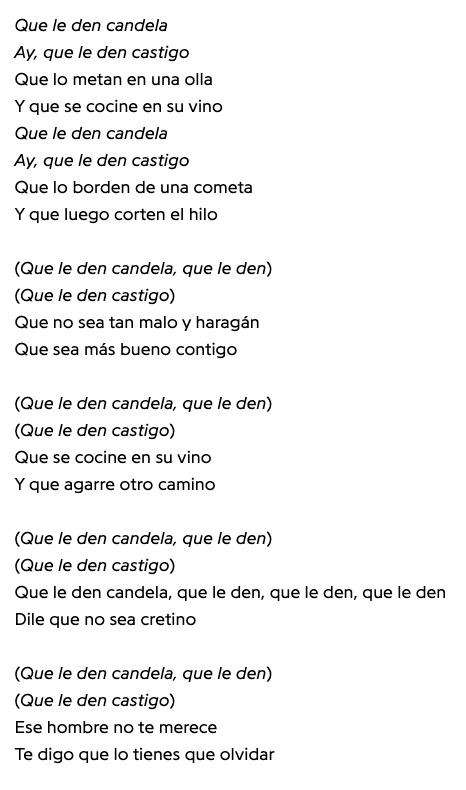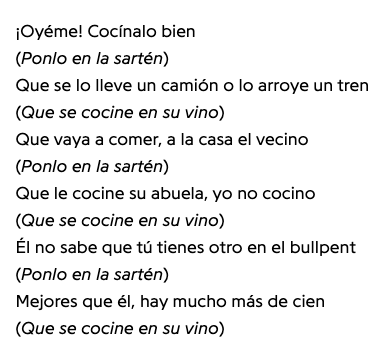★Que le den candelaは、キューバの作曲家ホルヘ・ルイス・ピロトがセリア・クルスのために書いた曲で、1994年に録音されたアルバム "Irrepetible"に初めて収録され、その後多くのサルサ・コンピレーションに収録されている1。セリア・クルスのトップ10曲のひとつとされて いる。この曲の中で彼女は、有害な関係から離れ、虐待に反抗するよう(女性の)親友に助言している。
| Que le den candela
es una canción escrita por el compositor cubano Jorge Luis Piloto para
Celia Cruz incluida por primera vez en el álbum "Irrepetible", grabado
en 1994 y posteriormente incluida en numerosos recopilatorios de
salsa.1 Entre otros recopilatorios la canción aparece Hits Mix 2002, y
en Su Música por el Mundo en Vivo (2008). Está considerada una de las
diez canciones más destacadas de Celia Cruz.2 En la canción aconseja a una amiga a abandonar una relación tóxica y rebelarse contra el maltrato. El compositor Jorge Luis Piloto explicó en una entrevista realizada por Alexis Valdés en 2020 que su esposa trabajaba en Sony, siempre se encontraba con el equipo de Celia Cruz y le pedían que escribiera una canción a Celia. En un principio dudaba porque el compositor estaba "en la onda de canciones de amor y de pasiones" (...) pero me dicen, no tienes que hacer una canción a la pasión... puedes hacer una canción a la experiencia" Así nació la letra de la canción: "Celia dándole un consejo a esta muchacha que está en medio de una relación tóxica... Este hombre que tu tienes no está en nada, en vez de enamorarte te desgasta, no tiene buenos modales y no es atento contigo, ese hombre no se merece que le den tanto cariño... que le den candela, que le den castigo, que lo metan en una olla y se cocine en su vino..." explica Piloto.3 https://es.wikipedia.org/wiki/Que_le_den_candela |
Que le den
candelaは、キューバの作曲家ホルヘ・ルイス・ピロトがセリア・クルスのために書いた曲で、1994年に録音されたアルバム
"Irrepetible"に初めて収録され、その後多くのサルサ・コンピレーションに収録されている1。セリア・クルスのトップ10曲のひとつとされて
いる2。 この曲の中で彼女は、有害な関係から離れ、虐待に反抗するよう友人に助言している。 作曲家のホルヘ・ルイス・ピロトは、2020年にアレクシス・バルデスが行ったインタビューで、妻がソニーで働いていて、いつもセリア・クルスのチームと 会い、いつもセリアに曲を書いてほしいと言われていたと説明した。最初は、作曲家が「愛と情熱の歌(...)に夢中だから」と躊躇していたが、「情熱の歌 を作る必要はない...経験の歌を作ればいい」と言われた。 こうして生まれたのが、「毒々しい関係の中にいるこの女の子にアドバイスをするセリア...」という歌詞だった。この男は何もしていない、あなたを惚れさ せるどころか、あなたを疲れさせている、マナーも守らないし、あなたへの気遣いもない、そんな男に愛情を注ぐ資格はない...カンデラを与え[そいつに火 を放ち]、罰を与え、鍋に入れ、ワインで料理する...」とPilotoは説明している3 。 サルサの女王は死後にPay-Backを受くる |
| LYRICS: QUE LE DEN CANDELA Azucar Ese hombre que tu tienes no esta en nada En vez de enamorarte, te desgasta No tiene buenos modales Y no es atento contigo Ese hombre no se merece que le des tanto cariño El duerme la mañana y tu trabajas Y luego por la noche se te escapa Te exige que tu le laves Que lo vistas y lo calces Y si acaso tu protestas Se indigna y quiere pegarte Coro: Que le den candela Ay que le den castigo... Que lo metan en una olla Y que se cocine en su vino Que le den candela Que le den castigo... Que lo cuelguen de una cometa Y que luego corten el hilo Ese hombre que tu tienes... buena amiga Si yo fuera tú, le dejaría.. Las maletas en la puerta, y una nota que dijera: A partir de este momento Que te cocine tu abuela (Coro).... Que le den candela Ay que le den castigo... Que lo metan en una olla Y que se cocine en su vino Que le den candela AY! Que le den castigo... Que lo cuelguen de una cometa Y que luego corten el hilo Que le den candela, que le den, que le den castigo, Celia: Que no sea tan malo y haragán Que sea mas bueno contigo.. Que le den candela, que le den, que le den castigo, Celia: Que se cocine en su vino, y que agarre otro camino... Que le den candela que le den, que le den castigo Celia: Que le den candela, que le den, que le den, que le den Dile que no sea cretino Que le den candela, que le den, que le den castigo... Celia: Ese hombre no te merece, te digo que lo tienes que olvidar.. Oyéme! Cocínalo bien... `ponlo en la sartén` Que se lo lleve un camión o lo arroye un tren ´que se cocine en su vino´ Que vaya a comer, a la casa el vecino ´ponlo en la sartén´ Que le cocine su abuela, yo no cocino ´que se cocine en su vino´ El no sabe que tu tienes otro en el bullpent.. ayy! ´ponlo en la sartén´ Mejores que él, hay mucho mas de cien ´que se cocine en su vino´ |
歌詞:QUE LE DEN CANDELA Azucar あなたが愛しているその男は、何の価値もない 恋に落ちる代わりに、あなたを疲れさせる 礼儀も知らない あなたに対して思いやりもない その男は、あなたがそんなに愛を注ぐ価値はない 彼は朝は寝ていて、あなたは働いている そして夜になると、彼は逃げ出す あなたに服を洗えと要求する 服を着せ、靴を履かせろと言う もしあなたが文句を言うと 怒って殴ろうとする コーラス: 彼に火をつけろ 彼に罰を与えろ... 彼を鍋に入れて 彼のワインで煮込め 彼に火をつけろ 彼に罰を与えろ... 彼を凧に吊るして そして糸を切って あなたのその男… 良い友達ね もし私があなただったら、彼を去らせる… スーツケースを玄関に置いて 「この瞬間から おばあちゃんが料理してくれ (コーラス)… 彼に火をつけろ 彼に罰を与えろ… 鍋に入れて ワインで煮込んで 火をつけて ああ!罰を与えて… 凧に吊るして そして糸を切って 火をつけて、火をつけて、罰を与えて セリア:そんなに悪い人じゃないで、怠け者じゃないで あなたにもっと優しくして… 彼に火をつけろ、彼に罰を与えろ、 セリア:彼のワインで煮て、別の道を行かせろ... 彼に火をつけろ、彼に罰を与えろ セリア:彼に火をつけろ、彼に罰を与えろ、彼に罰を与えろ 彼にバカにならないように言って 彼に罰を与えろ、罰を与えろ、罰を与えろ... セリア:その男はあなたにはふさわしくない、彼を忘れてしまえ... 聞いて!よく煮込んで... 「フライパンに入れて」 トラックに轢かせろ、電車に轢かせろ 「自分のワインで煮え死ね」 隣の家に食べに行かせろ 「フライパンに入れて」 彼の祖母に料理させろ、私は料理しない 「彼のワインで煮込ませろ」 彼は、あなたが別の男がいることを知らない… ああ! 「フライパンに入れて」 彼より良い男は、100人以上いる 「彼のワインで煮込ませろ」 |
| Listening to salsa : gender, Latin popular music, and Puerto Rican cultures / Frances R. Aparicio University Press of New England , 1998 | |
| Celia Cruz's defense of women,
such as in "Las divorciadas" and "Que le
den candela" (in her more recent recording, Irrepetible), 39 Milly y
los Vecinos's
"Ese hombre" (1991), and Sonia Lopez's "Castigalo" are examples of
cuts that speak in defense of women within heterosexual relations. Yet
the
lyrics of these songs establish gender in dualistic, oppositional terms
-
male versus female-that clearly denote tl1e traditional "battle between
the sexes." While Anglo American feminists may dismiss these songs as
samples
of gender oppression, in my opinion they must be understood within
the cultural, social, and historical contexts of (hetero )sexual
relations in
Puerto Rican society. These songs are valuable insofar as they
eloquently
articulate the struggles of Puerto Rican women and Latinas to empower
themselves by contesting the dictates of a strong patriarchal system.
Although
in the United States feminist scholars have moved beyond this paradigm
of male-female interaction, for many U.S. Latinas and Latin American
women their reality with men is beleaguered by outright conflict and
even physical violence. The fact that Lorena Bobbitt became a popular
heroine overnight among Puerto Rican women and that a new word --
bobitazo --
began circulating with innuendos of potential female revenge, indicates
that (hetero )sexual interactions are very much associated, culturally
and socially at least, with images of conflict and metaphors of war.
pp.167-168. |
セリア・クルスの「Las divorciadas」や「Que
le den candela」(最新作『Irrepetible』収録)、ミリー・イ・ロス・ヴェシーノスの「Ese
hombre」(1991年)、ソニア・ロペスの「Castigalo」などは、異性関係の中で女性を擁護する情景(cuts)の例である。しかし、これ
らの曲の歌詞は、男性対女性という二元的で対立的な言葉でジェンダーを確立しており、伝統的な "男女間の戦い
"を明確に示している。アングロ・アメリカンのフェミニストたちは、これらの歌をジェンダー抑圧のサンプルとして否定するかもしれないが、私の考えでは、
これらの歌はプエルトリコ社会における(異)性的関係の文化的、社会的、歴史的文脈の中で理解されなければならない。これらの歌は、強固な家父長制の支配
に対抗して自らを力づけようとするプエルトリコの女性やラティーナたちの闘いを雄弁に物語っているという点で、価値がある。アメリカでは、フェミニストの
学者たちは、このような男女の相互作用のパラダイムを越えてきたが、多くのアメリカ人ラテンアメリカ人女性にとって、男性との現実は、明白な対立や肉体的
暴力にさえ悩まされている。ロレーナ・ボビットがプエルトリコ女性の間で一夜にして人気ヒロインとなり、ボビターゾ(bobitazo)という新語が女性
の復讐を暗示する言葉として出回り始めたという事実は、(異性間の)性的交流が、少なくとも文化的・社会的には、対立のイメージや戦争のメタファーと非常
に結びついていることを示している。 |
| Yet authorship by women, as
essential as it is for the articulation of female
subjectivity in popular music, should not by itself mark an exclusive
space for the transformation of sexual politics. Celia Cruz's ever
popular
performance of"Usted abusó" (You abused me), the bossa nova Brazilian
theme she interpreted with Willie Colon, possibly had a more profound
liberatory impact on Latinas than many women-authored pieces. "Usted
abusó" articulates, from the abused victim's point of view, an
accusation or
indictment against the abuser in the heterosexual couple; the
open-ended
use of the second-person singular usted allows for either male or
female
performances and for the indictment of either sex. The performance of a
song, despite the sexual identity of its author, can indeed be
"gendered,"
both by performer and audience, depending on the performer's own sexual
identity and voicing. Celia Cruz's performance of "Usted abusó"
changed the original message of the song from that of a male diatribe
against a woman to that of a feminist anthem against sexual abuse and
domestic
violence. pp.173-174 |
しかし、女性による作詞作曲は、ポピュラー音楽における女性の主体性を
明確にするために不可欠なものであるのと同様に、それ自体がセクシュアル・ポリティクスの変容のための排他的な空間を示すものであってはならない。セリ
ア・クルスがウィリー・コロンと解釈したボサノヴァのブラジリアン・テーマ「Usted
abusó(あなたは私を虐待した)」は、おそらく多くの女性作詞作曲の作品よりもラテンアメリカ人に深い解放的影響を与えただろう。「Usted
abusó
"は、虐待された被害者の視点から、異性間のカップルにおける加害者に対する非難や告発を明確にしている。二人称単数形のustedを自由に使うことで、
男性でも女性でも演奏でき、男女のどちらを告発してもよい。歌のパフォーマンスは、その作者のセクシュアル・アイデンティティにもかかわらず、パフォー
マー自身のセクシュアル・アイデンティティと声の出し方によって、パフォーマーにも聴衆にも「ジェンダー化」されうるのだ。セリア・クルスの「Usted
abusó」のパフォーマンスは、この歌の本来のメッセージを、女性に対する男性の非難から、性的虐待や家庭内暴力に対するフェミニストの賛歌へと変え
た。 |
| In the 1990s, I would argue, the
continuing dominant trend toward salsa
romántica seems to exemplify another instance of feminization as I have
discussed
it in this book. This time, however, feminization is evident in the
industry-
induced hegemony and canonical status of bolero-informed songs
about individual heterosexual relationships. Most of the new salsa
interpreters
in the 1980s and 1990s, both men and women, invariably sing to
and about love, in contrast to the more heterogeneous thematic
repertoire
of salsa figures from the 1970s. While Olga Tañón's 1994 release,
Siente el
amor, includes only love songs, Celia Cruz's Irrepetible, released the
same
year, includes songs about (hetero )sexual relations, mostly in defense
of
women, such as "Que le den candela" and "La guagua." In the latter, she
defends women's rights to travel in city buses without being touched by
men, while in the highly political "Cuando Cuba se acabe de liberar,"
she
visualizes a utopian return to Cuba after the fall of Fidel Castro.
Willie
Colon's 1993 release, Hecho en Puerto Rico, presents love songs such as
"Idilio," an interesting fusion of salsa romántica with the lyrical
language
and versification of decimas jibaras. This song plays on the market for
love
ballads while simultaneously reaffirming national identity for Puerto
Ricans.
A song such as "Buscando trabajo" addresses the economic difficulties
and unemployment that Latinos face in the age of globalization and
dwindling job security for workers, and "Atrapado" narrates the life of
a
drug dealer in a song that denounces U.S. materialism. p.240 |
1990年代、サルサ・ロマンチカへの支配的な傾向が続いていること
は、本書で論じたような女性化の別の例を示しているように思える。しかし今回、女性化は、個々の異性間の関係を歌ったボレロの、業界が誘導したヘゲモニー
と正統的な地位に現れている。男女を問わず、1980年代と1990年代の新しいサルサ解釈者のほとんどは、1970年代のサルサ歌手の、より異質なテー
マのレパートリーとは対照的に、必ずと言っていいほど愛について歌っている。オルガ・タニョンが1994年にリリースした『Siente el
amor』にはラブソングしか収録されていないが、セリア・クルスが同じ年にリリースした『Irrepetible』には(ヘテロな)性的関係についての
歌が収録されている。後者では、男性に触れられることなく市バスを利用する女性の権利を擁護し、高度に政治的な "Cuando Cuba se
acabe de liberar
"では、フィデル・カストロ崩壊後のキューバへのユートピア回帰をイメージしている。ウィリー・コロンが1993年にリリースした『Hecho en
Puerto
Rico』では、「Idilio」のようなラブソングを披露している。この曲は、ラブ・バラードの市場を利用すると同時に、プエルトリコ人の国民的アイデ
ンティティを再確認させている。Buscando trabajo
"のような曲は、グローバリゼーションと労働者の雇用保障が減少している時代にラテン系が直面する経済的困難と失業について歌っている。
"Atrapado "は、アメリカの物質主義を非難する曲で、麻薬ディーラーの人生を物語っている。 |
 |
あなたのその男は、もう何の役にもたたないよ あなたに恋に落とすのではなく、疲れさせるよ お行儀がわるいし あなたをちゃんと扱わない その男はあなたが愛情をそそぐほどの資格もない 彼は朝には寝て、あなたは働きにでる 夜になるとあなたから逃げ出す 彼はあなたに体を洗うように要求する(=セックスせよと求める) それを着て、それを履くように そして、もしあなたがそれに抗議すると、 彼は、激怒して、あなたを殴ろうとする 彼に火が灯されるのだ(灯してください)、 ああ、彼は罰せられるのだ(罰してください) 鍋に入れて ワイン煮にしてしまいましょう〜♪ 彼に火が灯されるのだ(灯してください)、 ああ、彼は罰せられるのだ(罰してください) 彼を凧にくくりつけて、飛ばし その後で、凧の糸を切ってやりましょう アスーカル、アスーカル(お砂糖、お砂糖を、もってきて頂戴!!) あなたのこの男は、よい女友達です もしわたしが、あなただったら、彼をさっさと捨てるでしょうね 戸口にある荷物には、 次のようなメモが書いてありました、 これからはね、 「あんたのおばあちゃんに食事をつくってもらいなさい」とね |
 |
彼に火が灯されるのだ(灯してください)、 ああ、彼は罰せられるのだ(罰してください) 鍋に入れて ワイン煮にしてしまいましょう〜♪ 彼に火が灯されるのだ(灯してください)、 ああ、彼は罰せられるのだ(罰してください) 彼を凧にくくりつけて、飛ばし その後で、凧の糸を切ってやりましょう 彼に火が灯されるのだ(灯してください)、 ああ、彼は罰せられるのだ(罰してください) もうそんな悪はやらないように、怠け者でいないように あなたに、もっとよくするように 彼に火が灯されるのだ(灯してください)、 ああ、彼は罰せられるのだ(罰してください) ワイン煮にしてしまいましょう〜♪ 彼がいままでとは違う道を歩むように 彼に火が灯されるのだ(灯してください)、 ああ、彼は罰せられるのだ(罰してください) 彼に火を放ちてください、そうして、そうして、そうして…… もう馬鹿(=白痴なこと)をやらないように 彼に火が灯されるのだ(灯してください)、 ああ、彼は罰せられるのだ(罰してください) あなたにふさわしくないよ、この男は!! わたしゃ言うよ、そんなことはもう忘れさないと |
 |
よく聞きなさい、ちゃんと料理してね (フライパンのなかに入れてね) トラックに乗せられたり、列車に轢かれたりする (ワインと一緒に煮てね) そして、そとに食べにいかせなさい、隣家のお家で (フライパンのなかに入れてね) 彼のばあちゃんに作らせてね、私は(もう彼のために)料理はしないよ (ワインと一緒に煮てね) 彼は知らないよ、あなたが、別のプルペンにいることを (フライパンのなかに入れてね) 彼よりもまともなのは、百人はいるわよ (ワインと一緒に煮てね) |
Celia Cruz - Que Le Den
Candela (Official Music Video)
+++
Links
- Que
le den candela, Wiki.▶︎︎▶︎▶︎︎▶︎▶︎︎▶︎▶︎︎▶︎︎
リンク
- ▶︎▶︎︎▶︎▶︎︎▶︎▶︎︎▶︎▶︎
文献
- Listening to salsa
: gender, Latin popular music, and Puerto Rican cultures / Frances
R. Aparicio
University Press of New England , 1998
その他の情報



